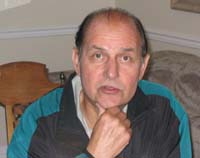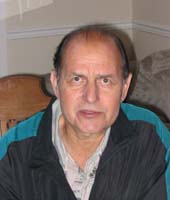
I caught up with Lubomir Mykytiuk during a break in the filming
of "Distant Drumming." Equally at home before a camera or a
live audience, this versatile actor has kept busy with film, TV,
and theater projects.
PW: We last talked in April, 2002. What have you been up to in the interim?
LM: I was involved in a series called "Street Time," which is being shown on Showtime. I had a bit of a recurring role. I did a few episodes as a lawyer for one of the young guys who got busted for drug dealing.
PW: Is that the Rob Morrow show?
LM: Yep. And last year I did a play--Agatha Christie's "The Mousetrap"--in Montreal. That was a lot of fun. I also had a little cameo in a miniseries they shot called "Hanssen" ["Master Spy: the Robert Hanssen Story"] last summer. I played a Russian sub-diplomat--one of the first people he contacts when he decides he's going to spy. That was shot in Toronto and in Washington, D.C.; I actually spent a couple days in Washington.

|
PW: So in the movie, we see you walking up to the actual Russian embassy in D.C.?
LM: Yeah.
PW: I saw your parts in "K-19: The Widowmaker" and "The Sum of All Fears."
LM: Yeah, those were both fun.
PW: Those were shot where?
LM: "The Sum of All Fears" was filmed in Montreal. Well, the principle photography was in Montreal. In "K-19, " I'm only in one scene, which is essentially I'm running through a submarine and then I go on top of the submarine and onto the dock. The surface stuff was shot in Halifax, and the interior stuff was shot in Toronto.
PW: Anything else recently?
LM: This spring, I did a Canadian/Italian co-production based on a novel written by this very good Canadian author, Nino Ricci, called "Lives of the Saints. " It's a wonderful novel about this dirt-poor family in Italy who emigrates to Canada. It's just lovely. Again, I had a cameo. I played a banker. But the fun part is that I got to do a scene with Sophia Loren.
PW: Really?
LM: Yeah, that was cool! I spent three days on the set with her.
PW: How was that?
LM: It was great. She's a real lady. Sometimes you meet big stars and they're no fun to be around at all; they're just not pleasant people. But she was really wonderful. And a very good actress. You can always tell on the set, when the lights go on, whether someone has to do 74 takes to walk through the door, or whether they can actually act. She was very good at it.
PW: Where was that filmed?
LM: This was shot in Toronto. And the next project that's interesting me right now--this is fun, you'll enjoy this--they're doing a miniseries on the Reagans. I think it's mostly about kind of the disintegration of Ronald Reagan as dementia took over more and more, and how much Nancy Reagan covered it up. Again, it's a cameo, but I get to play Mikhail Gorbachev.
PW: Oh, that will be fun! You know, I just heard that miniseries announced recently, and I'm trying to remember who's playing Ronald Reagan.
LM: James Brolin.
PW: And will that film in Toronto?
LM: Montreal. So just after I finish this, I have a few days off and then I go to Montreal.
PW: Where do you live?
LM: In Toronto. But I'm originally from Montreal.
PW: It sounds like there's a lot of filming going on in eastern Canada these days.
LM: Well, there is now, but I'll tell you, it was rough. That SARS thing really killed us in Toronto. It was awful. It was funny, because when you're living in Toronto, as we were, there was no perceptible change in your life. And yet I remember going to Montreal for a visit, and the headline even in the Montreal paper--the Montreal Gazette, which is the English-language paper--was "SARS Kills Again." I'm like, c'mon guys, this is absurd! People were calling me asking, "How are you?" like I was on my deathbed.

|
PW: Yet it was mostly health-care workers, right?
LM: It was essentially this one family that went to Hong Kong, and they met this one person who carried it on an elevator, and all the people were on this one elevator. So they brought it to Toronto, and then they got sick and went to the hospital. And anybody who had contact with them then before they kind of twigged that this was a serious deal [was in danger of infection].
But it was really isolated to the hospital. So one's normal life just continued. Maybe you'd wash your hands a little more frequently, but that's about it. But people were terrified. In terms of film and television production, it just died. I know of two major films that came here to Calgary from Toronto. One reason was that you have to insure your major actors, and the insurance companies just wouldn't do it. That was part of it. But also there were certain stars who didn't want to go there. Can't blame them, I suppose, but it wasn't realistic.
PW: It sounds like there's also quite a bit going on in Montreal.
LM: Montreal's a pretty serious production place. It comes close to Toronto in terms of production.
PW: Really? Most of it in French, though?
LM: No, not really. Well, they do a lot of French language. French-Canadian cinema has been, for decades, more volume, better quality than most English-language Canadian cinema--with some notable exceptions. But Quebec is really a culture unto itself, and they really support their stars. The only place in Canada where you have anything resembling a star system like what you have in the States is in Quebec. They really do love their stars. The rest of Canada is like, as soon as you become anything like a star, they like to throw stones at you. "You're going to start thinking you're better than the rest of us. We can't have that!"
PW: Besides the Reagan miniseries, is there anything else on your schedule yet?
LM: There's something we're still kind of talking about, a nice CBC production.
PW: But that's not definite yet?
LM: No.
PW: Any theater?
LM: I was offered one thing, but I turned it down. I didn't care for the role, and I didn't know the director or the other people. And because film and television has been so degraded in Toronto and now it's starting to pick up, I think I'd better hang in there and get my feet in.
PW: Keep yourself available.
LM: Yeah. But "North of 60 came" to the rescue, like the cavalry! If you're having a bad year and not working as much as you'd like to, "North of 60" comes to the rescue!
PW: Tim Webber was saying that things have been slow out his way, too.
LM: Yeah, Vancouver, too.
PW: They've got shows filming there, but a lot of Americans are taking those roles.
LM: Yeah, it's getting more competitive. Also, I think the Americans are getting a lot more defensive about the "runaway production"--a misnomer if I ever heard one. Ed Asner just made a speech not too long about it. He knows which side his bread is buttered on, and he's a former SAG [Screen Actors Guild] president.
But he did say one interesting thing, which was that what it does is kill your own productions, which is true. Because there's money [from U.S. productions that film in Canada] and that's where people's energies go, rather than focusing on your indigenous cinema. I think he's right. To some degree, our Canadian culture has suffered some because of that. You know, I'm as interested in Ronald Reagan and American politics as anyone else, but it's not Canadian. It's not part of our culture. It's not something about Johnny Macdonald.
PW: I know when the Canadian Television Fund cuts were announced last spring, I saw articles and press conferences in which Peter Keleghan and Paul Gross and many other people said, essentially, "We're shooting ourselves in the foot by not properly funding Canadian programs."
LM: Truly, we are shooting ourselves in the foot when it comes to Canadian culture and content. And there is such a thing. I'm not going to try and define it, but it is specific and it is palpable. I've lived in the States, and you're American, and when you come up here, it's palpably different. And there are reasons for it--historical, geopolitical.
PW: There are many fascinating Canadian stories to be told, but doing films about Ronald Reagan isn't telling them.
LM: We Canadians don't find our own history sexy the way Americans find their history sexy. But I'm not even just talking about historical culture; there's lots of other stories out there to be told. I've just been reading this fascinating book called "How the Scots Invented the Modern World. " It's a fascinating historical journey about the Scottish Enlightenment, particularly of the 18th century. What it makes me think of is that I wish someone would write a Canadian history book that's that enlightening.
PW: That would be great. And then bring it to television!
LM: Exactly, because that's the communication with the populace.
PW: Well, thank you very much for your time, Lubo. I know you have a long night of filming tonight, so I'll let you go rest up for a while.
LM: Yeah, a long night tonight for sure, but it's always great to see you.
Text and photos (c) 2003 Patricia F. Winter.
All rights reserved. For personal use only. Do not distribute to other persons by electronic or non-electronic means (including posting on a web site) without prior permission from the copyright owner.
Last updated 6/19/09